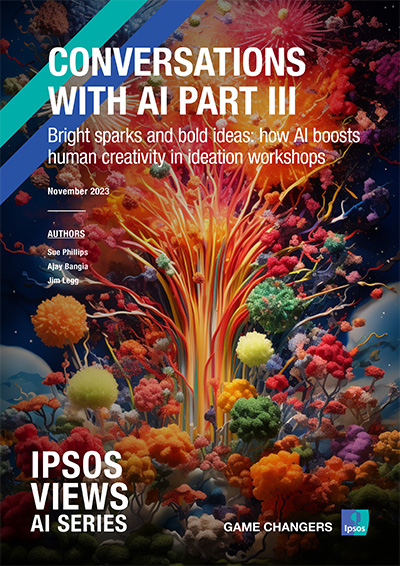Conversations with AI, Part III: How AI boosts human creativity in ideation workshops
 In the context of ideation workshops, it is crucial to precisely phrase challenges to ensure successful and novel ideas. Today's corporate climate often prioritizes quick fixes over careful assessment and addressing of challenges. However, by changing perspectives and rephrasing the issues, better answers can be found.
In the context of ideation workshops, it is crucial to precisely phrase challenges to ensure successful and novel ideas. Today's corporate climate often prioritizes quick fixes over careful assessment and addressing of challenges. However, by changing perspectives and rephrasing the issues, better answers can be found.
Generative AI offers enormous potential for encouraging alternative thinking and producing novel ideas. It can help individuals convey their ideas in a simple yet expressive manner by integrating existing concepts in innovative ways. AI may produce a variety of "how might we" queries using well-crafted prompts, challenging teams' knowledge of an issue and encouraging them to reconsider their aims.
It is vital to stress that Generative AI is trained to offer logical responses, whereas reframing necessitates non-obvious queries to inspire creativity. Obvious prompts may not offer many fresh concepts. Workshop participants are critical in reframing the topic and curating statements effectively. Rather from being the lone creator, generative AI should be viewed as a valued team member who contributes to the whole process.
Ipsos has developed intellectual property in its workshop reframing prompts, which can be used to generate a wide range of ideas and concepts by drawing inspiration from other industries. This helps break away from familiar patterns and encourages exploration of unconventional and novel ideas.
Download our latest POV for more about these key takeaways
- Precise problem framing is crucial in ideation workshops to generate meaningful and innovative solutions
By phrasing challenges in a specific and focused way, participants can find better answers. - Changing perspectives and rephrasing the issue can lead to better outcomes in ideation workshops
By using "How Might We" statements, such as in the example of improving boarding efficiency at an international airport, specific goals can be set. - Overcoming cognitive biases like familiarity bias and fixedness is important for fostering innovation
Familiarity bias restricts exploration of new ideas, while fixedness makes it difficult to question established structures. By challenging these biases, new and unconventional ideas can be explored. - Generative AI has the potential to encourage alternative thinking and produce novel ideas
It can integrate existing concepts in innovative ways and generate a variety of "how might we" queries to challenge teams' knowledge and goals. - Workshop participants play a critical role in reframing the topic and curating statements effectively
Generative AI should be seen as a valued team member that contributes to the overall process, rather than being the sole creator of ideas.
Want to learn more about generative AI and qualitative research?
In Conversations with AI, we explore the need to align with experts in the art of the question that can get the most out of AI solutions, including quality and accuracy, while defending data privacy.
In Conversations with AI part II, we explore how generative AI can be used within qualitative research. We conducted a series of tests to evaluate the utility and risks associated with AI outputs. They assessed AI suppliers in transcription, translation, and sentiment analysis using qualitative research platforms.


